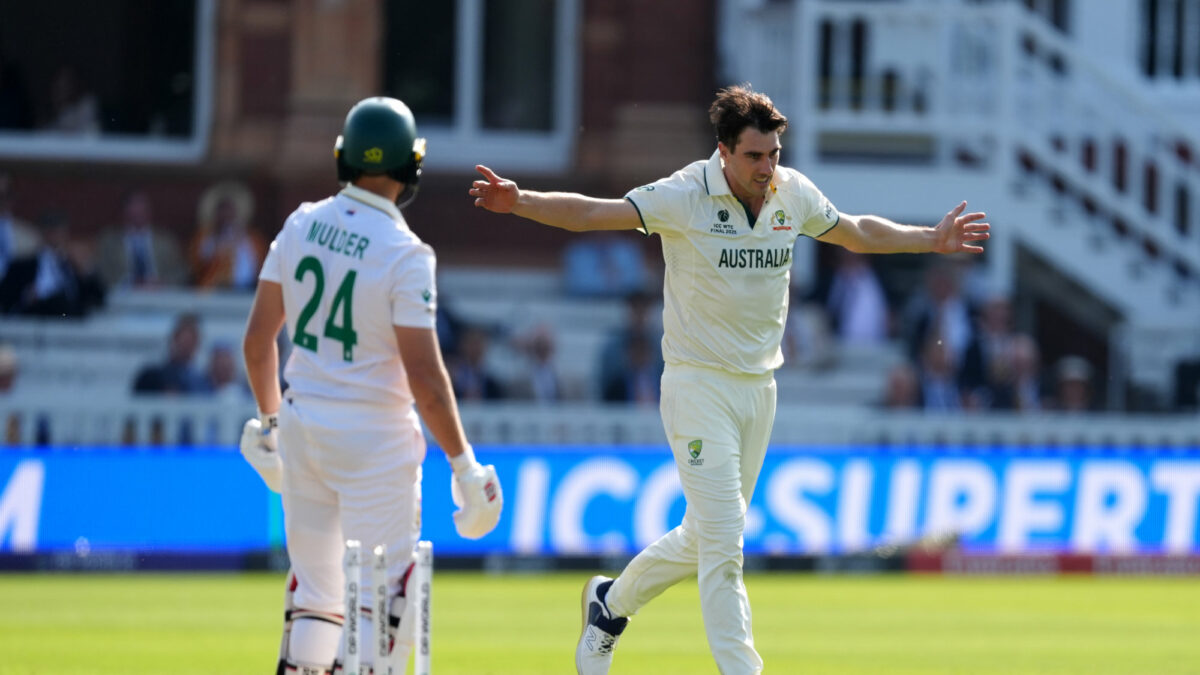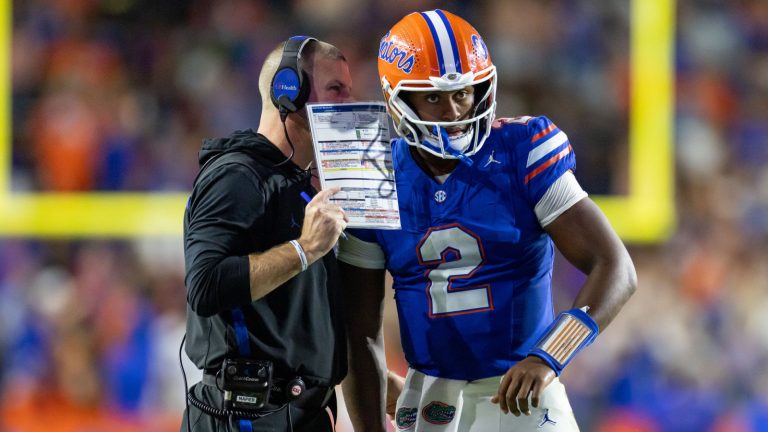On an explosive Day 1 of the World Test Championship final in which 14 wickets fell and ball well and truly dominated bat, it was only fitting that Steve Smith still found a way to enter the record books.
The most assured batter on either side by some distance, Smith’s 66 in difficult conditions was not only the centrepiece of an Australian 212 that looks more than competitive considering South Africa’s slump to 4/43 at stumps in the face of an inspired spell from the Aussies’ menacing pace attack, but also saw him become the most prolific overseas Test batter ever to grace Lord’s.
Given help by a chancy but ultimately successful 72 from Beau Webster in his first Test innings in England, the pair were made to work for every run by the brilliance of Kagiso Rabada, whose five-wicket haul (5/51) saw him make history of his own by becoming South Africa’s fourth-most prolific long-form quick – and earn a second spot on the famous Lord’s honours board.
The bowling was outstanding throughout, while the fielding, particularly behind the wicket, was of a standard befitting a Test Championship final … with one glaring exception.
Amid a masterful new-ball spell from Mitchell Starc that had already claimed the wicket of Aiden Markram in the opening over, the left-armer’s angle across the right-hander and the famous Lord’s slope combined to catch the outside edge of Proteas first drop Wiaan Mulder.
Floating as if in slow-motion to his right, Alex Carey shifted across, ready to swallow a bread and butter catch for any wicketkeeper, never mind a gloveman with as safe hands as the South Australian … and made a meal of the easiest catch of his career.
Starc, whose subdued reaction to the drop was one more of shock than anger or frustration, would soon after add a second wicket when Ryan Rickelton’s edge was safely pouched by Usman Khawaja at first slip.
But Carey’s relief only came when Mulder’s tortured innings was at last ended on 6 by a sharp Pat Cummins nip-backer that made a mess of his stumps, the threat of a match- and trophy-defining innings removed from over the wicketkeeper’s head.
Carey’s missed chance was still the exclamation mark on a nightmare return to Lord’s for the first time in white clothes since his infamous stumping of Jonny Bairstow in the 2023 Ashes etched his name in English cricket infamy, with the 33-year old having already thrown away a solid start to be bowled attempted an inglorious reverse-sweep to expose the lower order to the menace of Rabada.
5/192 at that point, having recovered well from a four-wicket opening session off the back of half-centuries from Smith and Webster, the last five wickets would add just 20 further runs, with Cummins, Starc, Nathan Lyon and Josh Hazlewood mustering just two runs between them following Carey’s dismissal.
Starc’s late strikes, as well as Smith’s latest Lord’s masterclass and Webster’s exhibition of riding his luck in his first Test in England, have given Australia more than a foothold in this contest, though; especially given South Africa’s brittle batting order and the likelihood conditions will improve the longer the Test goe s.
Nevertheless, the Proteas, hefty underdogs heading into the match, can be well pleased with their opening day’s work, with an elusive maiden ICC trophy – after years as perennial chokers in major events galore – within reach.
With Marnus Labuschagne chosen to partner Khawaja at the top of the order ahead of home summer hero Sam Konstas, a now familiar slow start against the moving ball was all but inevitable when the new pair were sent in by Proteas captain Temba Bavuma.
Three maidens were sent down before a Marco Jansen no-ball finally ticked the scoreboard over for Australia, with Khawaja failing to trouble the scorers before Rabada found his edge to be well snaffled by David Bedingham at slip.
Just three balls later, Cameron Green, for whom Labuschagne’s shift to open allowed him to return to the team at first drop, was squared up by the star South African quick, a low offering to second slip brilliantly pouched by Aiden Markram, the underdogs’ fielding matching the bowlers’ efforts.
With a remarkable record at Lord’s featuring two centuries and two more half-centuries in just seven innings, Smith was always going to be the key wicket, and there were shades of his 2019 Ashes heroics in his calm, unruffled start amid the early chaos.
Labuschagne soon edged behind off Jansen for a sturdy 17 unlikely to remove the wolf from the Queenslander’s door, while Travis Head’s counterattack lasted just 13 balls before strangling the same bowler down the leg side to be brilliantly snaffled one-handed by keeper Kyle Verreynne; amid it all, Smith remained untroubled.
Masterfully watchful outside his off stump and cashing in fully on the rare bad ball, the veteran’s one close shave was a Proteas review of a turned-down LBW that came back with umpire’s call on both impact and hitting the stumps.
At 4/67 at lunch and with Webster starting nervously, a crunching square cut to Rabada’s first ball of the second session signalled both Smith’s intent and the more favourable batting conditions on offer with the sun fully out over the home of cricket.
As has so often been the case in England over the years, the 36-year old seemed to be playing on a different pitch – where every Smith shot seemed to find the middle of the bat and plays and misses all but unthinkable, Webster needed a healthy slice of luck to survive a probing spell from Rabada and Jansen.
Umpire’s call again came to Australia’s rescue, with the Tasmanian’s long stride taking him fractionally outside the line of off stump for a South African LBW review off Jansen that was otherwise crashing into middle; perhaps gun-shy after the twin DRS failures, Bauma then opted not to challenge a stifled shout off Rabada that replays confirmed would have had Webster gone had they reviewed.
Despite looking consistently vulnerable, with an inviting gap opening up between bat and pad in his desperation to avoid presenting an LBW target, the 31-year old made the most of his good fortune as fluency slowly began to come.
With Webster’s sizeable frame flaying anything remotely wide to the cover boundary, a Smith cut off Rabada brought up both his half-century and the Australian hundred; not long after, he’d pass the legendary Sir Garfield Sobers’ 52-year record as Lord’s’ most prolific overseas batter in Tests.
As the slower Lungi Ngidi struggled to apply the same pressure as his fast-bowling brethren, and the arrival of spin to the attack in the form of Keshav Maharaj treated with disdain by Smith, Australia’s ship appeared to have steadied as the partnership reached 79.
Out of the blue, though, Smith’s wicket was truly burgled in almost accidental fashion by South Africa; with part-timer Markram brought on for an over to allow Mulder to change ends, an uncharacteristic heave from Smith brought only a thick edge, which Jansen, stationed at slip, did superbly to first reflexively parry to himself, then remain calm after several juggles.
There would be no third name on the Lord’s honour board for the Australian champion, with attention turning to a now-set Webster, bringing up a half-century of his own shortly after to continue to cash in on his earlier reprieve.
Just when the pair seemed set, Carey began what would be a horror finish to his day, attempting to welcome Maharaj’s return to the attack with a first-ball reverse-sweep that snuck under his swishing bat to disturb his furniture and ruin a typically classy innings of 23 that promised much more.
The tail exposed, Rabada needed no invitation to surge into the breach, first using the Lord’s slope to make mincemeat of Cummins’ off stump, then catching an attacking Webster’s outside edge to end the Tasmanian’s stay on 72.
Unlike in the 2023 Ashes, there would be no late heroics from Lyon, Jansen threatening Rabada’s supremacy by clattering into the tailender’s middle stump.
An over later, though, the 30-year old would scythe through Starc for his 17th Test five-for, a haul taking him past Allan Donald into outright fourth on South Africa’s list of all-time Test wicket-takers, with only Makhaya Ntini, Shaun Pollock and Dale Steyn left ahead.
Australia’s 212 loomed as below par, and certainly a far cry from the first-innings 469 that set up their 2023 WTC final win over India; but as it was during the Proteas’ 2-0 loss in their last Test series down under, batting loomed as the true test of their mettle.
Sure enough, Starc needed just six balls before a hooping inswinger hard Markram chopping on for a duck; he should have had a second in his third over, only for Carey to spare Mulder with a regulation drop.
Undeterred, the left-armer, dropped after the last WTC final in favour of Scott Boland for the first Ashes Test two years ago, coaxed an edge out of Rickelton, whose willingness to drive down the ground brought him three early boundaries but also his downfall for 16.
With Starc finding prodigious swing and Cummins offering no respite from Hazlewood, scoring ran secondary to survival: Bavuma would take 31 balls to at last get off the mark, while Mulder’s 44-ball stay yielded just six runs before the captain snaked through a gap between bat and pad.
Keen to get in on the fun, Hazlewood joined the wickets tally by skittling Tristan Stubbs for just 2 with a stunning nip-backer; with the Proteas reeling at 4/30, Australia, remarkable considering their own batting struggles, could consider themselves ahead in the match.
South Africa did, however, negotiate one final push from Cummins, with a pair of boundaries from Bedingham off the last two balls of the day ending a dramatic session in which nine wickets fell – and leaves the Test decider still firmly in the balance.






